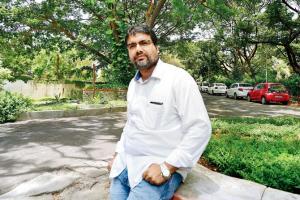The young man arguing for rehabilitating the destitute instead of penalising them is halfway through winning the war against the law

Mohammed Tarique played a key role in the government drafting the Model Legislation on Destitution. Pic/Suresh Karkera
Mohammed Tarique, 33
Founder, Koshish
ADVERTISEMENT
Standing inside the Chembur Beggars' Home in 2006, Mohammed Tarique, 22 at the time, had an epiphany. "It was a concentration camp," he says, recounting his horror at being there. "I don't think anyone has an idea how these people live. I felt I had to do something."
That same year, in May, Koshish, an intervention on homelessness and destitution, was born. This was not Tarique's first encounter with the destitute. The Tata Institute of Social Sciences (TISS) alumnus and native of Kanpur was deeply moved at 18 during his first encounter with the homeless. They told him how they went to sleep in the bitter cold with no idea if they would wake up the next day.
When he launched Koshish in 2006, Tarique says he didn't know how he would fight an entire system. What he did know was that he wanted to be at peace with himself and this would happen only if Maharashtra's draconian Beggary Law, which penalises people for being destitute, was thrown out. The Bombay Prevention of Begging Act, 1959 was first drafted for Maharashtra and later adopted by several states. Under it, the police have discretionary powers to pick up someone with no visible means of subsistence loitering in a public place. If convicted, the person can spend upto 10 years in jail.
Koshish has played a pivotal role in the Central government drafting the Model Legislation on Destitution. Although the draft bill is yet to turn into legislation, from complete silence to formal acknowledgement of the Beggary Law being anti-poor is a significant step forward, says Tarique. The new law will attempt to set up outreach units at the district level and offer assistance to those who qualify as destitute.
Koshish engaged with the administration to gradually build an atmosphere of empathy and compassion. Though the state hasn't done much in terms of reforming the law, instances of caretakers identifying patients from the barracks or facilitating the tracing of inmates' families are common. "I believe this empathy is among the most critical changes that Koshish has brought about," says Tarique.
A student of criminology and political science, he challenges the government on its response to the poor. But he is certain that the answer lies in working within the system and therefore, partners with the government on all his programmes.
Koshish now works in three states and has supported more than 40,000 people. "It would have been impossible to create this impact without my team, committed and compassionate, driven by a strong sense of integrity," he says. Along the way, activists, journalists, lawyers and academicians have also extended their support.
While his father Mohammed Iqbal, and three brothers had hoped Tarique would join the IAS, his mother Sarwari and sister Shabnam have offered unflinching support. This, he says, is crucial if he is to continue his work. Which is why marriage is not on his mind. "The woman I marry would have to be okay with my work, which has no money or security."
 Subscribe today by clicking the link and stay updated with the latest news!" Click here!
Subscribe today by clicking the link and stay updated with the latest news!" Click here!






